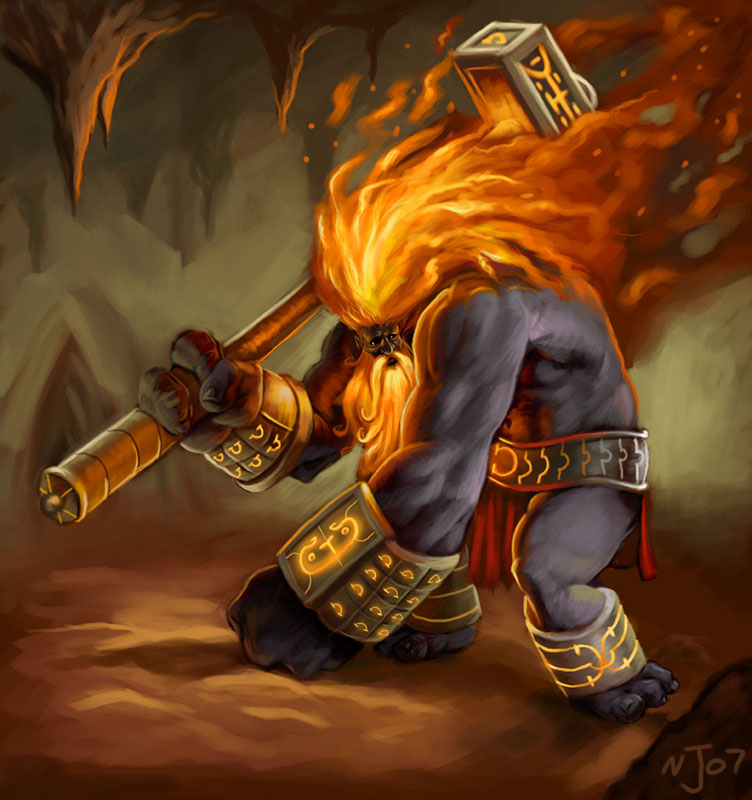Featuring Mythologies- Vulcan
February 28, 2019
Most of us have heard of the famous Greek gods; Zeus, Poseidon, and Hades. Some have heard of their Roman counterparts; Jupiter, Neptune, and Pluto. Greek mythology and Roman mythology are quite similar, but some things are altered a bit, like names or certain traits. In Roman mythology, Vulcan is the Roman god of fire and blacksmithing.
Vulcan was known not only for being a god of fire and blacksmithing but also as a member of the council of gods. He was considered the ugliest of the gods. This unfortunate trait led to some of his problems, some that began right after his birth.
As Jupiter’s wife, Juno was upset that Jupiter had had many kids, but none with her. So she took the initiative and had her own child. However, her red-faced, crying newborn was unattractive. Juno, disgusted by her child, threw him off of Mount Olympus. He fell into the sea after a full day and night of falling. Not surprisingly, his fall broke both his legs and left him with a permanent limp.
Thrown from Olympus, Vulcan was raised by sea nymphs. He’d walk the beach, and collect coal and seashells, which he stored in an underwater grotto. Eventually, Vulcan learned to make fire from the coal and how to make beautiful crafts. This talent made him the blacksmith of the gods and made him responsible for making all the objects of beauty and magic that belonged to the gods.
His crafts were first noticed when one of the sea nymphs wore a necklace crafted by Vulcan to a party on Mount Olympus. Juno was amazed by its beauty and demanded to know where the nymph got the necklace. Upon learning it was crafted by her abandoned son, she ordered his return to Olympus.
Unenthusiastic about the order of return to Olympus, Vulcan sent a gift to Juno. Thrilled with the gold and jeweled chair as her gift, Juno jumped to sit in the chair, but upon sitting down she was entrapped in unbreakable chains. To free Juno, Jupiter betrothed Venus, the beautiful goddess, to Vulcan as a deal.
Being the goddess of beauty and love, Venus was not a loyal wife. One of her various affairs was with Mars, the god of war. When Vulcan found she was having an affair with Mars, he was enraged. In an attempt to seek revenge on Venus and Mars, he crafted an unbreakable, golden net to capture them in and for all the other gods to ridicule them. Unfortunately, the other gods made fun of Vulcan instead and Jupiter was angry about how he made a big deal of the affair. The myth goes that every time a volcano erupts, it’s because Vulcan is so angry at Venus for another affair.
In a story revolving the birth of Minerva, Vulcan played a role in her birth. Before the time of his marriage, Vulcan wanted to help Jupiter with his pounding headache, so he split open Jupiter’s head. From the cut, Minerva sprung out.
Vulcan played another important role in Roman mythology as in the story of Pandora’s box. He was tasked with creating Pandora herself from clay and giving her life. He made her beautiful, but foolish. Jupiter had ordered him to do this in a blind rage after the treacherous act of Prometheus as he stole fire from the gods. After her marriage to a titan, Epimetheus, she brought the box that she was told not to open. Unfortunately for mankind she opened and released all evil spirits upon mankind.
Romans on every 23rd of August would hold a festival Vulcania, and they would build shrines outside of the city limits, so as not to burn the city down. They would prepare sacrifices to Vulcan so that food and grain would not burn. Unfortunately, despite their sacrifices, the Great Fire of Rome occurred in 64ad. After this, the sacrifices and celebrations became bigger to placate Vulcan. However, the change in sacrifices didn’t help, and the Mount Vesuvius erupted, causing the destruction of Pompeii.
Nowadays, there is still a modern day reference to Vulcan. For you Star Trek fans, you may have noticed the connection. The planet of Vulcan has a fiery surface and had fields of lava and volcanoes. The race of extraterrestrials from Vulcan were also skilled craftsmen like that of the Roman god Vulcan.





































































































































